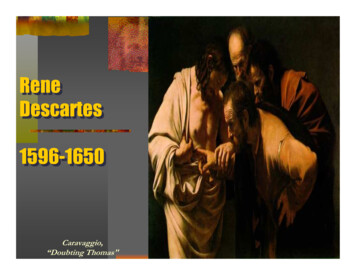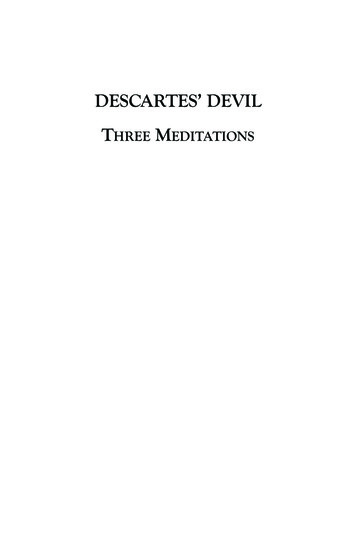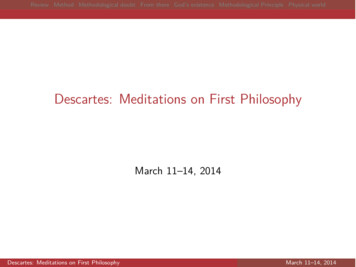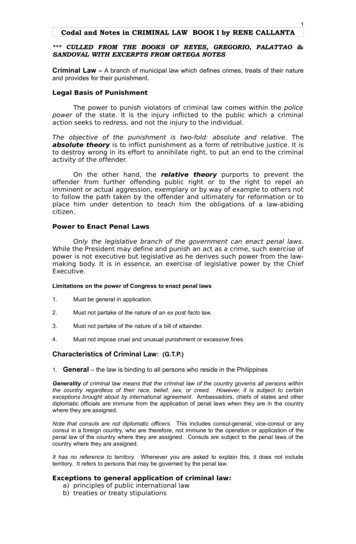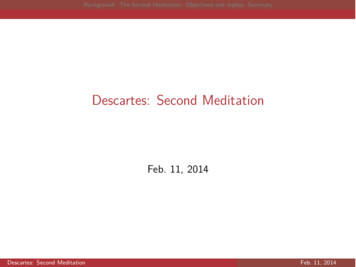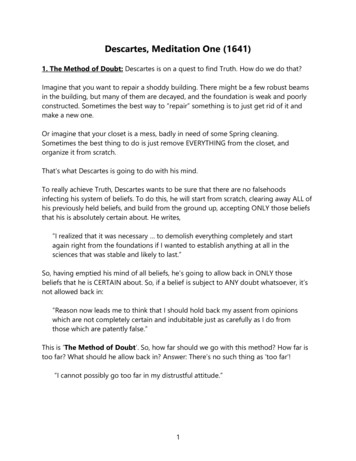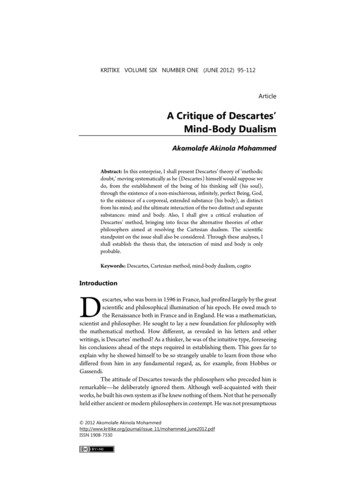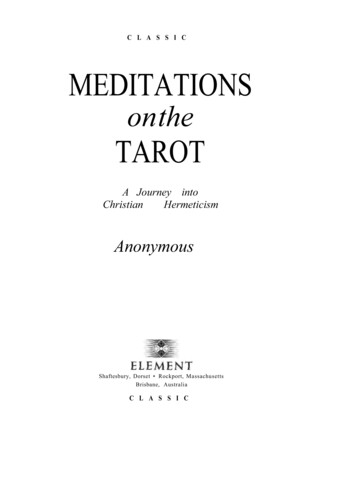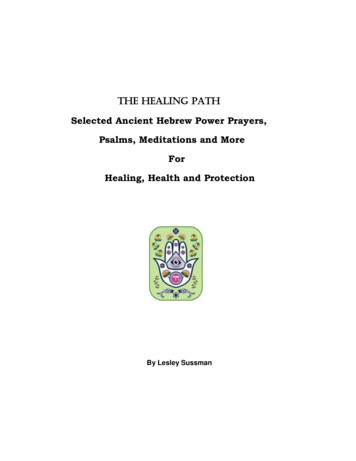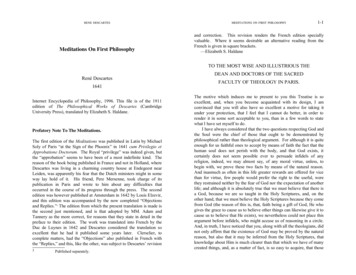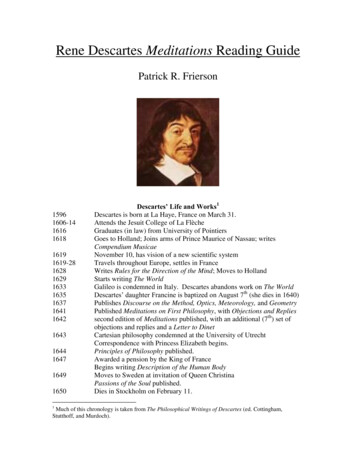
Transcription
Rene Descartes Meditations Reading GuidePatrick R. 1635163716411642164316441647164916501Descartes’ Life and Works1Descartes is born at La Haye, France on March 31.Attends the Jesuit College of La FlècheGraduates (in law) from University of PointiersGoes to Holland; Joins arms of Prince Maurice of Nassau; writesCompendium MusicaeNovember 10, has vision of a new scientific systemTravels throughout Europe, settles in FranceWrites Rules for the Direction of the Mind; Moves to HollandStarts writing The WorldGalileo is condemned in Italy. Descartes abandons work on The WorldDescartes’ daughter Francine is baptized on August 7th (she dies in 1640)Publishes Discourse on the Method, Optics, Meteorology, and GeometryPublished Meditations on First Philosophy, with Objections and Repliessecond edition of Meditations published, with an additional (7th) set ofobjections and replies and a Letter to DinetCartesian philosophy condemned at the University of UtrechtCorrespondence with Princess Elizabeth begins.Principles of Philosophy published.Awarded a pension by the King of FranceBegins writing Description of the Human BodyMoves to Sweden at invitation of Queen ChristinaPassions of the Soul published.Dies in Stockholm on February 11.Much of this chronology is taken from The Philosophical Writings of Descartes (ed. Cottingham,Stutthoff, and Murdoch).
Meditation OneBefore doing the reading:1. Descartes’s book is called Meditations on First Philosophy. Let’s start with the factthat it’s a set of Meditations. In his Preface to the Reader, he says, “I do not adviseanyone to read these things except those who have both the ability and the desire tomeditate seriously with me” (38b). What do you think it would take to “meditateseriously with” Descartes? Look at the rest of D’s sentence on 38b. Are you willing tomeditate with him for the next few weeks? How will you ensure that you do this?2. Now let’s turn to the topic of the book, “First Philosophy.” What sort of philosophydo you think ought to be done “first”? Where should philosophizing begin? Why?While reading:1. What sort of skepticism is implied by the claim that “it will suffice for the rejection ofall of these opinions if I find in each of them some reason for doubt”? Could someone bemore skeptical Descartes? Is it reasonable to be as skeptical as he is, at least “once in mylife”?2. What “reasons for doubt” does Descartes give in the first Meditation? As you read thefirst Meditation, try to identify and list out as many distinct skeptical arguments as youcan. By the end of the first Meditation, is there anything left that has not been doubtable?Which argument do you think is the best? Which is the weakest?
While rereading:1. Pay close attention to each distinct skeptical argument in the first Meditation. Foreach one, ask the following questions:a) What range of beliefs does this argument call into question?b) How/Why? That is, what reasons does Descartes give for challenging thisrange of beliefs?c) What range of beliefs does this argument not call into question?d) How good does Descartes think that this particular skeptical argument is?How seriously does he take the threat? (Note that there is at least oneargument that he raises, but doesn’t take particularly seriously. Which one?)e) How good is this skeptical argument in fact? That is, how seriously shouldDescartes take it?(As you reread, you may find new skeptical arguments. That’s part of what rereading isfor!)2. At the end of the first Meditation, Descartes says, “Accordingly, I will suppose anevil genius who has directed his entire effort at deceiving me.” What does the“Accordingly” refer to? What does this imply about the role of the evil genius inDescartes’s Meditations?
After rereading:1. At the end of this Meditation, what level of skepticism is (provisionally) justified byDescartes’s arguments? Has Descartes given arguments that, at least for now, covereverything anyone might think they can know? If not, what’s left up for grabs?2. What is the most convincing skeptical argument in this meditation?3. Are you skeptical of everything at this point? That is, do you think that it’s impossibleto have real knowledge of anything?4. Is Descartes skeptical of everything at the end of the Meditation?5. Recall Descartes’s claim at the end of his Preface that “no one of sound mind has everseriously doubted” that there really is a world, etc. How does that change yourassessment of this Meditation?6. Look back at the synopsis of Med. 1 on p. 39a. Do you agree with Descartes that thefirst Meditation accomplishes the goals he describes here? How much hope do you havefor future Meditations? How much knowledge do you think will eventually be able towithstand these skeptical challenges?7. Look briefly at only the first two paragraphs of Meditation II. At this point in theMeditations, how confident is Descartes that he will escape his skeptical worries? Whatwill he do if he can’t prove anything? Is that a good response to skepticism? Why or whynot?
Meditation TwoBefore doing the reading:1. Look back at the synopsis of Med. 1 on p. 39a. Do you agree with Descartes that thefirst Meditation accomplishes the goals he describes here? How much hope do you havefor future Meditations? How much knowledge do you think will eventually be able towithstand these skeptical challenges?2. Look briefly at only the first two paragraphs of Meditation II. At this point in theMeditations, how confident is Descartes that he will escape his skeptical worries? Whatwill he do if he can’t prove anything? Is that a good response to skepticism? Why or whynot?3. How would you respond to Meditation One? Why?While reading:1. How does Descartes prove that he exists? (Don’t just say that he says “I thinktherefore I am.”) Does his argument work? Against what sort(s) of skepticism? Does itadequately respond to each of the skeptical concerns in the first Meditation? Is there anyskeptical objection that works even against the claim that “I think”? Is there a newobjection to that claim? What?2. As you read through this Meditation, write down at least three distinct key claims thatDescartes claims to have established over the course of the Meditation. How does he (ormight he) justify these in the light of his skeptical objections?3. Don’t skip the discussion of the wax at the end of this Meditation. Why doesDescartes include this? What is his point?
While rereading:1. Notice the title of this Meditation. What does this title imply about the main point ofthe Meditation?2. By the end of the third paragraph, Descartes has proven that “‘I am, I exist’ isnecessarily true ” and he moves on to the question of “what I am.” What is his answerto this question? Work through at least two key passages:a) “But for how long? For as long as I am thinking . . . I am therefore preciselynothing but a thinking thing . . .” (44b)b) What else am I? . . . But is it perhaps the case that these very things which I taketo be nothing . . . nevertheless are no different from that me that I know? This I donot know, and I will not quarrel about it now” (44b)c) For thinking through these passages, it might help to go back to Descartes’ssynopsis of Med. 2 (p. 39).3. Descartes claims that this Meditation proves “the nature of the human mind” and “thatit is better known than the body.” How does he prove the latter claim?After rereading:1. Recall Descartes’s reason for using the method of doubt (from p. 40b). At this point inthe Meditations, are you convinced “that [facts that men have bodies and there really is aworld] are neither so firm nor so evident as the arguments leading to the knowledge ofour mind” (40b)? Does it seem likely (or even possible) that Descartes will be able toconvince you that these facts are also not as firm and evident as “knowledge of God”(40b)?2. Is Descartes’s argument that I am “a thing that thinks” sound? How many of you areon board with him at this point? Why or why not?
Meditation ThreeBefore doing the reading:1. By the end of the last Meditation, Descartes was convinced “that [facts that men havebodies and there really is a world] are neither so firm nor so evident as the argumentsleading to the knowledge of our mind” (40b). But he eventually hopes to show that thesefacts are also not as firm or evident as “the knowledge of God.” What differences arethere between the mind and God that might make knowledge of God more uncertain thanknowledge of the self? What, if anything, might make knowledge of God less certaineven than knowledge of physical things?2. Before reading Meditation Three, spend a moment to dwell on your own possibletheophobia. Descartes insists that his readers “withdraw their minds from allprejudices,” but most of us, whether personally religious or not, have a lot of prejudicesabout God. As you read through this chapter, try to avoid projecting your own prejudicesabout “God” onto Descartes; instead, actually pay attention to what Descartes means byGod, and then remain open-minded about whether he actually succeeds in his proof. Youcan hold him to high standards; he holds himself to high standards. But don’t dismiss hisarguments out of sheer theophobia.While reading:1. Look closely at the first four paragraphs of Med. 3. What is the central claim of thefirst two paragraphs? Is that claim at least provisionally justified (that is, does the lastMeditation give Descartes good reason to at least think that it “seems” to be true)?Why does he start talking about God in the fourth paragraph? Does it make sense forhim to bring up God (again) here? Why?What is the key issue of this Meditation, as stated at the end of ¶4? Why is this suchan important issue? Is Descartes correct that it’s important?
While reading, continued:2. Much of this Meditation is taken up with Descartes’s proof that God exists. Duringyour first reading of the Meditation, try to reconstruct Descartes’s proof as a validargument,2 making clear each premise and how those premises lead to the conclusion“God exists.” As you outline this argument, keep a few things in mind:a.b.c.Descartes’s argument is not the following:i. I have an idea of God.ii. Anything I have an idea of must exist.iii. Thus God must exist.This argument, but not Descartes’s, works for fairies and unicorns as well as for God. If youend up thinking that this is the argument that Descartes gives, think harder.In the course of his argument, Descartes distinguishes between “objective” and “formal”reality. The terminology here is very misleading, so pay close attention to how Descartesdefines these terms. Come to class prepared to explain what the difference between the twois. (Consult p. 72 for some help with this.)In the course of his argument, Descartes talks about something being “more real” thansomething else. Try to figure out how you might understand this phrase in a way that wouldmake sense of his argument. Note in particular his examples of “more reality” on 49b: asubstance is “more real” than its accidents or modes. Roughly speaking, a “substance” is athing (such as a tomato), accident is a fundamental property of that thing (say, containingcarbon, hydrogen, and oxygen; or taking up space), and a mode is the particular way that theaccident shows up in a particular case (the particular chemical composition of the tomato; orits particular size and shape).Lay out your argument reconstruction below (you may need more or fewer than 9 steps):1.2.3.4.5.6.7.8.9. Therefore, God exists (based on steps , , and above)2Recall that a “valid” argument is one where the conclusion logically follows from the premises. A “sound” argumentis one that is valid and has true premises. (Hence the conclusion of every sound argument is true.) It is helpful inreconstructing arguments to find a way of presenting the argument so that it turns out to be valid, even if this involvesadding premises or slightly modifying the presentation of the argument from the text. This way, you can focus onevaluating the premises to determine whether the argument is sound (and the conclusion thereby true).
While rereading:1. Before rereading, look over your reconstruction of Descartes’s argument. At thispoint (but not sooner), you can use Descartes’s own reconstruction of the argument(on p 75a) to refine your own. Now, make sure that you have a valid argument.Then, look at the premises. Which ones seem false or poorly-defended? What arethe best objections to Descartes’s premises? (See too appendix A.)2. As you read through the Meditation again, keep one eye on your reconstruction ofDescartes’s argument. Correct that reconstruction as you go along. Also look forCartesian responses to your objections to his proof.3. Option: You might want to go back to the argument from “chance” creation in thefirst Meditation. If a Darwinian were to revisit that argument here, would it be asappropriate as Descartes’s revisiting of the God argument? What would become thecentral question for this Meditation if we approached it with that Darwinian concern?How might the Meditation unfold in that case?4. Option: As you reread, keep your eyes out for three important issues in thisMeditation that we are going to pass over (for the sake of time):a) Judgments vs. Ideasb) Material Falsity (This was a big issue in D’s time – see Objections in book –and is a major topic of debate among philosophers who study Descartes today)c) Impulse to believe vs. light of nature (latter “cannot be doubtful”).Some Objections and Replies:1. Start by clearly formulating your own best objection to Descartes’s argument(s) to theexistence of God.2. In his objections to Descartes’s Meditations, Arnauld famously raises an objectionthat has become known as the “Cartesian Circle.”a. Look at the objection on p. 86b, the passage starting “My only remainingconcern ” What is the objection? How might Descartes respond to it?b. Now look at Descartes’s response on p. 92, the passage starting “Finally, as tothe fact ” Is this an adequate response? Why or why not?3. On pp. 79-81, Hobbes raises several objections to Descartes’s argument for theexistence of God. Look especially at his objections that “there is no idea in us ofGod” (79b) and “Does reality admit of degrees?” (81a), along with Descartes’sreplies. What are Hobbes’s objections? What are Descartes’s replies? AreDescartes’s replies adequate?
After rereading:1. What is the best objection to Descartes’s argument for the existence of God?2. What is the best Cartesian response to that objection?3. Is Descartes’s argument for the existence of God in the Third Meditation convincing?4. What difference does it make whether his argument is convincing or not?a. What difference does it make for the rest of his knowledge-project?b. What difference does it make in general?
Meditation FourBefore doing the reading:1. Meditation Four will be motivated by the “experience that I am subject to countlesserrors” (54-55). Why would that be a particular problem at this stage in theMeditations?2. Assuming that you are on board with everything Descartes has done in Meditationsone through three, how would you explain human error?3. Whatever your views (if, e.g., you favor an evolutionary over a Cartesian approach tothe origin of your mental faculties), how could you provide for the possibility ofgenuine human knowledge while still adequately explaining the experience of humanerror?4. Is there any adequate way to distinguish knowledge from mere belief?While reading:1. In the course of this Meditation, Descartes runs through many of the classicexplanations of human error (and human evil). In the first half of the Meditation, tryto pick out as many possibly distinct ways of explaining human error/evil as you can.2. Then, in the second half of the Meditation, look for traces of these distinct argumentsin the complex overall account Descartes actually puts forward as his own.3. As you read, compare Descartes’s account of human error with your own. DoesDescartes successful show how human beings can err while at the same timepreserving the possibility for real knowledge? Does he successfully identify acriterion for distinguishing the cases? (Here it will help to recall his discussion of the“spontaneous impulse” and the “light of nature” on 49a.)While rereading:In your rereading, focus on Descartes’s account of human freedom. Before starting thisrereading, ask yourself what your own view of human freedom. What would it take forhuman beings to be “free” in a sense that matters? Do you think we are free in thatsense?1. How can Descartes reconcile his claim that “the faculty of willing is incomparablygreater in God than it is in me” with his claim that “God’s faculty of willing does notappear to be any greater [than mine]” (56a). (Note that these claims are in the samesentence!)2. What does Descartes mean when he says that “Were I always to see clearly I wouldnever deliberate In that event, although I would be entirely free, I could never beindifferent”? What is the difference between “freedom” and “indifference”? Whichis more like your (antecedent) conception of freedom? Which is more important?3. What, in sum, is Descartes’s conception of human freedom? What, if anything, is hemissing?After rereading:1. Based on the account of error in Meditation Four, what are the prospects for comingto have knowledge of the world? How should such knowledge be pursued?
Meditation FiveBefore doing the reading:1. At the start of Meditation One, Descartes said he would “raze everything to theground and begin again from the original foundations.” How much has Descartesmanaged to rebuild? At this point in the Meditations, what do you (if you havefollowed Descartes all the way) actually know?2. Go back to your initial list of skeptical arguments. Which arguments have beenanswered? Which have not?3. Note again the title, and focus on the first half. What do you think it means to talkabout “the essence” of material things? How might this be different than showing(about God) “that He exists”?While reading:For your first reading of this Meditation, try to bracket the discussion of God and focuson what Descartes is saying about our knowledge of material things.1. At the end of Meditation Five, what do we know about material things?2. Do I know that anything other than I and God exist?3. What new knowledge did I gain from this Meditation?While rereading:For your rereading, pay attention to Descartes’s (new) argument for the existence of God.1. Descartes says, “From the fact that that I am unable to think of a mountainwithout a valley, it does not follow that a mountain or a valley exists anywhere,but only that, whether they exist or not, a mountain and valley are inseparablefrom one another. But from the fact that I cannot think of God except as existing,it follows that existence is inseparable from God, and that for this reason he reallyexists” (59).a. What contrast is Descartes drawing between these two cases?b. What justifies (or might justify) this contrast?2. Why does Descartes include this argument, given that he has already proven theexistence of God? How does this argument fit into Meditation Five?After rereading:1. Now that we’ve finished this Meditation, how much knowledge has Descartesmanaged to rebuild? At this point in the Meditations, what do you (if you havefollowed Descartes all the way) actually know?2. Has this Meditation answered any new skeptical arguments? What more (if anything)needs to be done?
Meditation SixBefore doing the reading:1. What is left for Descartes to prove in this Meditation? Given what he has said so far,how many of the beliefs with which he (and you) started do you think will besalvaged by the end of the Meditation? Which belief (that you think he’ll salvage)will be the hardest to prove? Why? How would you prove it?2. What do you believe about the relationship between the mind and the body (inparticular, the brain)? Is the mind just the same thing as the brain, or is it somethingdistinct? Is one dependent upon the other? In what ways? If they are distinct, howdo they affect each other? If they are the same thing, why does it seem possible tomake certain claims about mental states (e.g. “my belief was false”) that don’t seemto make sense about the brain (what could it mean to say “my brain-state was false”)?3. Do you believe that there is an external world? Why? Does your reason stand up tothe skeptical concerns of Descartes’s first Meditation?While reading:1. In this Meditation, Descartes aims to prove both the existence of the external worldand the distinction between mind and body. As with the argument in MeditationThree for the existence of God, these are complicated proofs. Reconstruct bothproofs as valid arguments and identify the premises of each proof. (Do this on aseparate sheet of paper.)2. The proof that ends on the first paragraph on p. 64a ends with the conclusion, “It iscertain that I am really distinct from my body, and can exist without it.” (For partone, you should have reconstructed Descartes’s argument for this claim.) But on p.65a, Descartes claims to be “commingled with [the body],” so that “I and the bodyconstitute one single thing”. How is this compatible with the proof on 64a?3. Note that the last 9 or 10 paragraphs of this Meditation (starting with “I have alreadyexamined ” on p. 66a) echo the argument of Meditation Four. There Descartes wasinterested in how his reason could lead him astray. Here he is interested in how,given the goodness of God, his senses can lead him astray. How is his solution to theunreliability of the senses different from his solution to the unreliability of reason?What implications does this have for gaining knowledge from the senses?
While rereading:1. While rereading this Meditation, focus on the implications of this Meditation (and theprevious one) for Cartesian knowledge of the sensible world. What will it actually bepossible to know in the strict sense about material things? What will (still) not bepossible to know?After rereading:Having finished the entire Meditations, it’s time to take a step back.1. First, go back to your list of skeptical arguments from Meditation One.a. Which does Descartes think he has addressed? Where does he think headdressed these? Fill in your list of arguments with specific references tothe Meditation (and page number) where Descartes “answered” thatskeptical argument.b. Did Descartes address them successfully?2. If you were to really take the Meditations to heart, how would it change the way youthink about the world?3. If you were to really take the Meditations to heart, how would it change the way youlive?
Appendix One: Descartes’s EthicsBefore doing the reading:1. Go back to your responses to the last question above. How would taking theMeditations seriously affect the way you might live your life?2. Try to guess what is coming. Given what you know of Descartes thus far, what doyou expect his ethics to look like? Think of clues in the Meditations that mightindicate where he will look for his ethical theory.While reading the Discourse:1. As you read through Part Three of the Discourse, highlight those aspects ofDescartes’s view here that fit particularly well, on a first impression, with theMeditations. Jot at least two of those down here.2. At the same time, highlight those that seem particularly at odds with the Meditations.Jot at least two of those down here.3. Now, before rereading, think about how you might reconcile the Discourse with theMeditations.While rereading the Discourse:1. Pay close attention to the passages you thought about. Does Descartes say anythingthat might help you reconcile the Discourse with the Meditations?2. Be sure you spend some time with each of the “three or four maxims.” (First, arethere three, or four? Figure this out.) Jot each one down, in your own words.
3. Do you find these plausible? Which is the most plausible? Which is the least? Why?For the one that is the least plausible, why do you think Descartes would haveaffirmed it?After reading the Discourse:1. Spend some time over the next day or two with Descartes’s ethics in mind. Howwould living according to the maxims of the Discourse actually affect your life? Asyou face practical decisions, ask yourself, WWDD (What Would Descartes Do?).2. What features of the ethics of the Discourse would you like to incorporate into yourown ethical life? What would you definitely not want to incorporate? How wouldyou modify his ethics to improve it?
Descartes’s Ethics, continued: after the DiscourseBefore doing the reading:1. Go back to your responses to the last question above, and now think aboutDescartes’s ethics from the perspective of Princess Elizabeth. What issues do youthink she might have with his ethics?The next set of readings The rest of the readings from Descartes’s ethics cover a lot of territory. I’ve given threeadditional readings. I’ll focus on a few key questions for each.The Dedicatory Letter to the Principles of Philosophy. The Principles of Philosophywas the book that Descartes considered his magnum opus, the sum of all his philosophy.We are reading just the letter in which he dedicates this work to Princess Elizabeth. Inthat letter, what does he say about the overall project of his philosophy as a whole? Whatare the main reasons to engage in philosophy? How does philosophy in general relate tomoral philosophy in particular? (And, just to prepare you for a soft-ball quizquestion What metaphor does Descartes use on p. 186 to describe the relationshipbetween metaphysics and moral philosophy?)Correspondence with Elizabeth. Earlier, we read Elizabeth’s critiques of Descartes’smetaphysics, particularly her questions about how the soul and body relate to oneanother. Now we are looking at correspondence focused on moral philosophy. Whattraces of Elizabeth’s earlier concerns resurface here in her questions about moral theory?What are two important questions/concerns/objections that Elizabeth raises forDescartes’s moral theory? How does he respond?Then Pay close attention to the four “things most useful for us” to know on pp.111-112. Identify at least four distinct truths useful to know. At least two should befamiliar, but pay close attention to how Descartes uses metaphysical truths he’s discussedearlier in order to justify ethical conclusions. At least one of these truths should seemquite new. What is this truth? Do you think it makes Descartes’s ethics better or worse?Passions of the Soul. Elizabeth consistently pushed Descartes to write a book explainingthe relationship between mind and body and how one could gain control over one’spassions. What are the core ethical claims he advances in the Passions? What do theseadd to his ethical theory overall?After the readings 1. Identify the two most important changes that Descartes made to his ethical theory,after the Discourse on the method. Why did he make these changes? Do they makehis theory better or worse?2. In the end, what are the greatest strengths and weaknesses of Descartes’s “mature”moral theory?
Appendix Two: Argument Engagement GuideCan God be a deceiver?This appendix gives a set of examples for how to deal with passages in variousauthors where authors make important claims with little-to-know directjustification. Descartes makes such a claim near the end of Meditation Three(on p. 54a): “It is manifest by the light of nature that all fraud and deceptiondepend upon some defect.”How should we assess this claim? The first few positions below are veryunsophisticated, but later one gives more and more complex ways of responding(many of which can and should be used in conjunction). As you interact with claimsof philosophers (and others) in this class (and elsewhere), you should aim for moreand more complex forms of engagement.1. Weak endorsement: “I agree with Descartes. I can’t see how God could be adeceiver.”2. Weak objection: “Descartes doesn’t give an argument for this claim, so I don’tsee why I should accept it.”3. Strong objection—Arguing for the opposite: “Descartes doesn’t give anargument for this claim, and here is a good reason to reject it: .”4. Strong endorsement—Arguing for the position: “Although Descartes does notflesh out his argument, we can see why it would be impossible for God todeceive in this way: .”5. Strong objection—response to strong endorsement: “Descartes does not fleshout his argument for his position, but we might think that he has in mindsomething like this: . If that is what he has in mind,though, then the argument doesn’t work because .” Note here thatthe better the argument for the position, the stronger the objection is.6. Stronger endorsement—Arguing for position and defending it against critics.7. “Immanent” endorsement: “Descartes does not flesh out his argument for hisposition, but if we look elsewhere in the Meditations, we can find furthersupport.” Then you need to go on and build the argument from what he sayselsewhere.8. “Immanent” critique: “This claim (and/or Descartes’ argument for the claim)might seem plausible, but in fact it conflicts with what Descartes sayselsewhere. In particular, ” (see 55a-b for an example of a text youcould use for this).9. Argument revision. Give a strong endorsement and a strong critique, but endwith neither a rejection nor an endorsement of the argument, but a “ThusDescartes’ argument works, but only if he changes such-and-such about hisconclusion (or argument, or some other part of his view).”
Appendix Three: Using History to Do PhilosophyBoth your first paper (on Descartes) and your Final Paper require that you address aquestion of philosophical significance and use historical philosophers in order to giveyour own answer to that question. This balance between exegesis and original argumentcan be tricky. Y
Rene Descartes Meditations Reading Guide Patrick R. Frierson Descartes’ Life and Works1 1596 Descartes is born at La Haye, France on March 31. 1606-14 Attends the Jesuit College of La Flèche 1616 Graduates (in law) from University of Pointiers 1618 Goes to Ho
